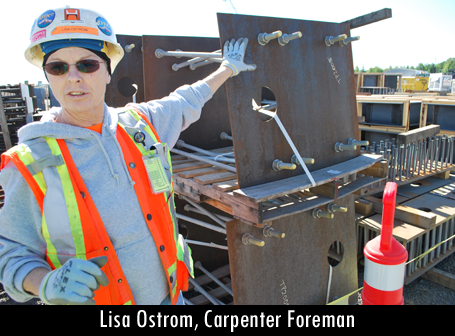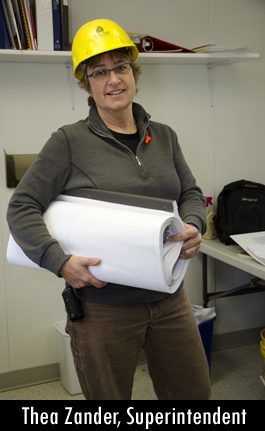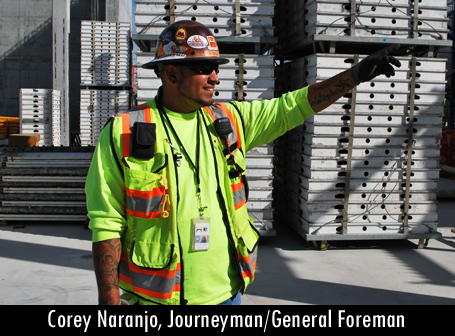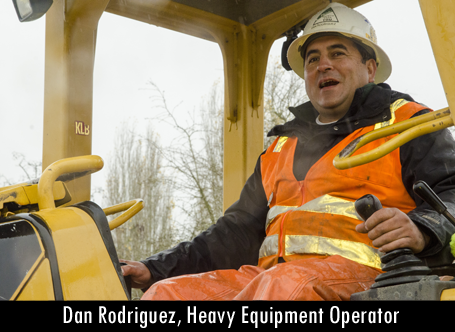Uncategorized
Teamwork, Attitude and Paperwork: “TAP” into your future in the trades
I attended the Union Apprenticeships in the Building Trades Information Session at Portland YouthBuilders today and learned a whole lot about the great opportunities in construction, elevator construction, floor covering, electrical, cement masonry and others.
It was a one-hour presentation on the different building trades that offer apprenticeship programs. It takes place on a quarterly basis and is geared towards folks who are interested in a career and for those who counsel people on careers.
There were several representatives from the trades who spoke to the benefits and expectations with regards to a career in the trades. There were also some really great videos. I learned so much! For example, did you know that elevator construction workers are the highest paid job of all the trades?
The panelists also shared insights about what is needed to be successful in any of the trades. Those qualities include:
* Being a team player
* Having a great attitude
* Establishing a great reputation
* Completing your paperwork
Now, I’m not seeking work in those trades but I do work for an organization that helps women find work in those industries. I’ll be sure to be passing on information about future events but you might want to get this one on the calendar:
March 6, 2015
Central Electrical Training Center
33309 Highway 99E
Tangent, OR 97389
— Dennise
Jodi Guetzloe Parker: Oregon’s First Female Building Trades Council Head
It’d be impossible to talk about female leaders in the NW construction trades without mentioning Jodi Guetzloe Parker. As the second woman to ever lead a building trades council in the United States (she was elected executive secretary treasurer of the 25-craft Columbia Pacific Building and Construction Trades Council in 2012), Guetzloe Parker has become somewhat of a role model for women, even beyond state lines.
But though she’s now spent over two decades in the trades – initially as a Cement Mason, then a rank-and-file member, elected official, and staffer at the Laborers Union Local 320 — the mother of one, stepmother of three, and grandmother of four came to the trades for the same reason many do: she couldn’t afford not to.
The self-deprecating Guetzloe Parker says the catalyst was losing her wallet, and with it, a bonus she’d received from her minimum wage job with a clothing company many years ago. “My friend [a Cement Mason] said, if that small amount of money is so impactful in your life, you need to join our apprenticeship program,” Guetzloe Parker says.
She couldn’t argue. She’d been working since she was 15, when she slung hamburgers at a carhop at a drive-in café (unless you count sweeping the floor for lunch money at six years old in her neighbor’s garage) – and at times still depended on social services to raise her kid.
“Thank God for public assistance because that carried us through,” Guetzloe Parker remembers. The subsidies were put to good use. “I’m a good investment! I’ve paid a lot of taxes and donate a lot of money. Social programs are so necessary, and have a good return.”
Guetzloe Parker grew up in Kamiah, Idaho, having her daughter when she was 20 years old and moving to Vancouver, Washington when she was 21. There she started cleaning hotel rooms, worked at Hi-School Pharmacy, a baby clothes company, and finally became a member of the Cement Masons at 32 years old.
Something clicked. “I was able to be outside, go to work, get dirty, and not worry about if my shirt was pressed for my $8/hour job,” Guetzloe Parker tells us. Finally, the single mom was on track to being able to independently support her family.
Her rise involved a fair amount of self discipline. “One of the things that make me who I am is being sober for 25 years,” says the building trades leader. “I have to do things to maintain that sobriety, but it’s part of what makes me a better leader.”
Unfortunately, a back injury derailed her career for one “horrible” year – at one point she was told she’d never be able to lift anything over five pounds again. Against the expectations of some of her doctors she returned, becoming a secondary list traffic flagger, then traffic control supervisor for Stacy and Whitbeck. She moved through various jobs with the Laborers – punch list foreman, quality control inspector — before running for an auditor’s office at the union. From there, she was hired at a staff position, eventually leading to last year’s election as the head of the building trades council.
What’s it like to be a female leader in the trades? “It’s tough,” Guetzloe Parker says. “And I’ve always been tough on myself. But you have to always give 110 percent, and I listen. I think I’m pretty good at letting people talk – I want to listen to them.”
Because, as she’s quick to point out, no one succeeds entirely on their own. “Bill Bruce [Stacy and Witbeck’s Interstate Light Rail superintendent] was my mentor,” Guetzloe Parker says. “He took me from a flagger to traffic control supervisor and to punch list foreman. He believed in me when I did not believe in myself. He told me, “You grow, or you go.” She grew.
When it comes to advice for the next generation of women in the trades, Guetzloe Parker begins, “Take a deep breathe. Carry on. We have resources everywhere. Develop friendships with men and women. Lean into them. “
Which is not to say, go soft. “And never let somebody take your tools away,” Guetzloe Parker concludes, with a smile.
Lisa Ostrom: “The girl” becomes the foreman
Back when Lisa Ostrom was growing up in Clark County, Washington, there were no opportunities for the young tomboy to play sports. But there was woodshop. Ostrom took four years of woodworking classes in high school. Small wonder that now she’s a foreman on Hoffman Construction’s Intel project in Beaverton.
Or at least, she was. And she will be again – but for the moment, the 53 year old is dealing with another challenge: ovarian cancer. She was diagnosed this year with stage three tumors after noticing some irregular stomach bloat, and has been plowing through rounds of chemotherapy while she waits to be deemed able to get back on the job.
“I get bored easy at home,” Ostrom tells us, once again outfitted in her hard hat and safety vest on the day that she is interviewed by Oregon Tradeswomen, Inc.
It’s clear that Ostrom’s workmates miss her as much as she misses them. An endless parade of peers come up to give her hugs, ask her about her wellbeing – nothing too technical, just enough to show to even the casual observer that she’s an integral part of the Hoffman team.
But there was a time when a woman working on a building trades site was not that common of a sight. After working at a teen clothing store, doing inventory and purchasing for a bearings company, furniture store, and Custom Aluminum, Ostrom got a job flagging on the Delta Interchange. Her employer, Kiewit, liked her and suggested that she join the Laborers.
“I would have liked to join the Operators,” Ostrom remembers. “But that takes confidence – back then I didn’t have any.” After working with the Laborers for a spell, she joined the Carpenters, never looking back after working on the Bonneville Locks for nine months, and a number of bridges and water treatment plants shortly thereafter.
Back in those days, it was rare to see woman on the job. “I was known as ‘the girl’ for a while, because there wasn’t very many girls at that time,” Ostrom says. But she took it upon herself to find team equilibrium, studying the way her coworkers did their jobs – right down to what they wore. “I just tried to dress like they did,” says Ostrom. “Sweatshirt, Levi’s, I didn’t try to wear makeup.”
At 37 years old, she started working for Hoffman. There, she became a foreman, overseeing the work of others. At first, she tells us, she played it stern. “Some of the guys around here may remember me from back then,” she laughs. But after awhile, the job – and developments in her personal life – taught her that oftentimes success comes with softening up a little.
“You get the job done faster if you can all communicate,” Ostrom reflects. “You have to know when to diffuse certain situations.” She says the company places a premium on positive feedback and supervisors who can keep their cool in high pressure situations.
After our interview, she tells us she’s off to speak with her supervisor about coming back to her job in a way that will mesh with her ongoing chemo sessions.
She drums her neatly manicured nails on the table when we ask her what her advice is for women entering the trades – she’s worked at Oregon Tradeswoman, Inc.’s annual Women in Trades Career Fair for a number of years, so it’s a question that she’s used to answering.
“You gotta listen and learn,” she says. Make sure you really think hard about the profession you’re choosing. “As long as you’re willing to do that, the guys are willing to help you.”
Ostrom should know a thing or two about conquering difficult situations – the responsibility she’s entrusted with on the job serves as proof she’s mastered the skills of her trade. And the challenge of going into a field where women were once rarities can’t be as all consuming as Ostrom’s experiences with chemotherapy – but perhaps the rules have some similarities.
Says the sunny, tough tradeswoman: “The first time you feel like giving up, you feel so sore. But then you go in again, and you see everyone is going through the same thing.”
“I think the trades have made me more outgoing,” she reflects. “I think they can really bring out the best in you.”
Tyrone Belgarde: One Determined Construction Estimator
It’s hard to believe that at one point Tyrone Belgarde had an attitude problem. Nowadays, the Oregonian is a valued, longtime member of the team at Knife River’s Tangent, Oregon offices. The 39 year old has been with the company for nearly 20 years, and has risen from an entry-level Laborer position on the grading crew to his current position as Construction and Estimation Manager.
“He’s one of the nicest guys,” his coworker says to us admiringly when we visit to talk to Belgarde about becoming a building trades leader.
Maybe he always was the helpful man we see during our interview, but circumstances were such that in his early days as a worker, Belgarde was a bit difficult to keep employed. His parents divorced when he was five years old, leaving his dad to deal with his addiction problems apart from the family. Belgarde and his mom and siblings moved around a lot. He went to boot camp before his senior year of high school, and graduated from South Albany High School by the skin of his teeth before returning to boot camp for his second stint. He enrolled and dropped out of Linn-Benton Community College at age 18. “I didn’t have enough money, was too immature to go to college,” he says.
Shortly thereafter he found work at an underground utility company in Salem. “It was not good,” he said. “I was a jerk and got fired – I deserved to get fired!”
Belgarde says he’s not sure what caused his transformation into responsible worker, but it happened sometime during his years at Knife River (originally Morse Brothers when he was first hired).
“It was quite a culture shock,” he says of the professional pace of jobs there. But he found his rhythm, landing a spot as an apprentice in the paving crew. “They said ‘if you want us to invest in you, to teach you how to pave, this is your opportunity.”
So he dug in, moving from Paving Crew Laborer to Roller Operator, to Screed and Paving Operator, to Paving Foreman, working jobs from Portland to Eugene. By the time he was 29, he had two daughters and a son. He now teaches occasional classes for Grand Ronde and Siletz Native Americans through the Northwest College of Construction. He honors his father’s heritage by participating in tribal events, sending his kids to culture camp to learn about being Native.
But still: “When I talk about things like vision – I don’t have a long term vision. When people talk about your five year goal – well I have a goal to get through today.”
That attention to the task at hand, perhaps, is part of what makes him a good leader. “Identifying a problem, figuring out your options, and acting,” Belgarde says, is his general way of moving through work. He places a high value on teaching, as a leader in his workplace.
And when he sees a position he wanted, he goes for it whole-hog. Take estimation work – Belgarde showed up to observe Knife River estimators for free during part of a winter, absorbing the information with such commitment that management took him on, first at minimum wage, then as a full-fledged member of the team. Now he’s a manager who is working on a $10 million Newport airport project, the only worker in his part of the office without a college degree.
He says that working in the trades has made it possible to provide for his family, and it’s satisfying to boot. “I can’t drive anywhere without seeing a driveway or a parking lot that we’ve built. You remember all the funny stuff from that site, like the person who spilled oil all over the place,” he laughs.
When he’s asked about advice for beginning building trades folks, Belgarde is hardly at a loss. “Always move forward. Always ask questions about what you need to work on. Don’t expect others to do it for you.”
Thea Zander: A Tradeswoman With an Eye for Adventure
For someone who loves hard work, Thea Zander is surprisingly positive about the times in her career when, as a Carpenter, she’s been without a job for a month or so.
“I love that part of it!,” the superintendent says. “They’re like, we’ll see you in a month and I’m like, perfect, road trip! When you’re a Union Carpenter you can go anywhere and work if you choose to.” It goes to show that, even within the established schedules and important protocols of the building trades, there’s still ample room for adventure.
Despite a level of commitment that led her to be named “Safe Person of the Year” by her Walsh Construction peers, Thea Zander finds time to go off the beaten track to help community rebuilding projects. After Katrina struck New Orleans, Zander joined an all-female framing crew with Habitat for Humanities to apply her skills to post-hurricane relief efforts.
Growing up in Montana, Zander spent high school doing housekeeping at a resort. She attended the University of Montana for a number of years, studying environmental biology and archaeology before leaving to live the ski bum lifestyle for a number of years.
Later, while living in Olympia, Washington and working for a tree company, a carpenter friend steered Zander to Walsh Construction. Zander’s first job in the trades entailed building dormitory housing for a college as a laborer.
It was the first time Zander had ever contemplated a future as a tradeswoman. “I’d never considered construction,” she says. “I always thought it was just – well, rednecks and beer.” But: “When I became a Laborer I felt I’d found my niche,” she says. “I loved the organization part of it, and the constant movement.“
“The guys were so decent,” she remembers. “Decent, smart, and hardworking. I thought I really like these people.”
From her entry-level Laborer apprentice gig, Zander became a Carpenter Apprentice, Journeyman Worker, a Crew Lead, a Foreman, Assistant Superintendent, and finally stepped into her current position of Superintendent.
She’s clear on what her priorities on the job. “A great leader is somebody who is knowledgeable about what they’re looking at, they understand structures and interiors and how they go together. Organizational skills, and then communication skills – you need to be able to talk to people in the field and have them understand what you want from them.”
Zander counts her honor years ago as Safe Person of the Year among the most memorable moments on the job. “It was huge for me just because it was a vote by all my peers,” she says. “It just meant a lot that they thought that much of me.”
As a woman, and an out lesbian, Zander deals regularly with common perceptions of who can be a building trades worker – often dealing with demands to “see the superintendent” with a cool “you’re looking at her.”
But within the trades she’s rarely felt unsupported by coworkers. “People in the trades don’t care [about your sexual orientation],” she says. “What they want you to do is their job.”
And once you’ve seen Zander on the job, there’s no question about who is in charge. Zander coordinates crews of architects, engineers, carpenters, plumbers, electricians, drywallers, roofers, and more in a harmonious performance that a recent blog post on the Walsh Construction likened to a symphony.
To women who are thinking of a career in the trades, Zander – who often volunteers for Oregon Tradeswomen, Inc. — would counsel careful forethought – and a predilection for physical labor. “It’s hard work, but it’s very tangible, you can see what you’ve done every day,” she says. “Respect your coworkers. Treat them with respect and they’ll do the same. If they don’t, just walk away from them.”
For those looking to rise the ladder as she did: “Work hard and keep your eyes open. Watch the process. The more you know the more marketable you are. If you do the best you can and give it 100 percent, things will just work out.”
As for what the future holds for Zander, think more road trips – she’s only a few years away from being able to retire comfortably. Yet another bonus of a career spent doing what she loves.
Bobby Lewis: The wide receiver finds success off-field, too
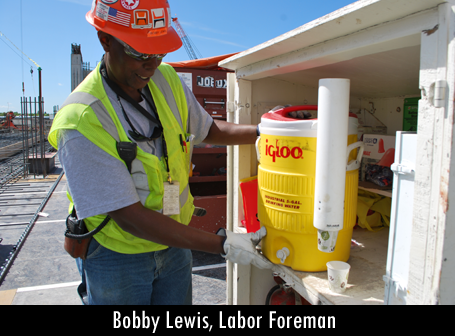
When 54 year old Hoffman Construction laborer foreman Bobby Lewis thinks about advice for young people of color entering the construction trades, he thinks of fortitude, enthusiasm. “You’ve got to want to be here,” he says on the day we interview him. “I think I’ve told a number of people that.”
It’s clear from watching the good-natured, easygoing Lewis go about his own duties that he enjoys his work. On the Intel building site that Hoffman is developing in Beaverton, he oversees a crew of six who are in charge of taking care of their coworkers’ well being – stocking first aid stations, making sure that there’s ample water supply for workers laboring under the hot summer sun. “Laborers are the backbone of this whole operation,” he smiles.
But having begun his career in the construction trades almost two decades ago, Lewis knows it’s not always that easy for men of color to get a hold in the industry. “When I got started, it was tough for a black male. You have to work harder than anyone else. You had to be sure of what you’re doing.” Nowadays, he’d like to see more minorities on building sites. “I don’t know why I don’t,” he reflects.
Lewis worked his first building construction job at age 35 at the US Federal Courthouse in Portland. Before that, the Portland-raised University of Washington wide receiver, who dropped out when he hurt his back and his girlfriend got pregnant, had a variety of gigs. He worked at the rail yard (like his dad before him), as a loan officer (“That’s a hard job to do, because what you’re doing to people isn’t fair”), and as a Laborer at the shipyards.
At each step of the way, he says he felt a little nervous – but dove right into expanding his skill set. On the shipyards, “I was a little nervous, a little scared, not knowing what to expect.” That first day at the US Federal Courthouse, he was stumped when foreman Mike Delgado (who is still Lewis’ supervisor and mentor) asked him what a MSDS was. “I didn’t know!” Lewis says in mock horror remembering that day. For aspiring Laborers, psst – the acronym stands for Material Safety Data Sheet.
The steep learning curve of the trades, Lewis says, is more than worth navigating. “I’ve been able to support my family.” He takes trips to the coast with granddaughter Natalia in the family’s own trailer, one of the many items he’s been able to buy on his union paycheck.
His friendly, capable manner has also meant he’s been able to get promotions that showcase his leadership skills. Though he was initially reluctant to become a foreman, now he enjoys the position. “I like delegating. I like seeing ahead to what needs to be done, staying a step ahead of everything.”
“A good leader is someone who can listen to their crew,” he tells us. “Someone who can take suggestions. Not try to intimidate, dominate situations.” Clearly, his years on field taught him some things about teamwork.
And so, despite challenges, Lewis recommends the trades to anyone who has considered their options and thinks they’re up to the job. He will often say as much to young people he meets out in the world, such as stopping to advise the security guards he passes at work on his way to clock in. “Work hard,” he advises. “Be caring. Listen. Get to work on time. Be sure of yourself.”
Katie Kost: Graduating to a New Level of Leadership
Anyone who thinks that major construction sites are no place for a woman to spend her professional life should talk to Hoffman Construction Material Manager and Laborer Foreman Katie Kost. She’s found a unique job in the building trades that fits the arsenal of skills she gained in college and in various jobs. Plus, it’s meshed well with her life outside of work. Kost was on the job up until two weeks prior to giving birth to her baby last year.
Not to say that life has been free of challenges. “You have to have tough skin,” says Kost. As a female, “you just have to work hard. It’s not an easy trade. But for me, who has been to college, and wanted to do sports marketing, it’s been great.”
After earning extra money by delivering Domino’s pizzas for $7/hour, Kost graduated from Barlow High School at 18 as a star volleyball player. She received a full ride from North Carolina State to play her sport. She wound up transferring to Portland State her senior year, and left that school with her degree in business management.
After college, Kost wound up working at Lowe’s, then doing inventory at a wholesale auto dealer. She became close friends with a surveyor who had ties to Hoffman Construction, and through the strength of her inventory managing experience, Kost got her first job in that area with the company in 2005.
But Duane Meduna, a Hoffman Superintendent, was impressed by what he saw, and invited Kost to step into the “hybrid job” (as Kost puts it) of Materials Manager/Laborer Foreman. For the position, Kost spends time in the Hoffman offices, but also out on building sites, advising workers on how to keep track of expensive supplies. She’s worked on the concrete crews as well, she says, to get a hands-on feel for the work.
Before Kost got on the job, she says, losses in materials per job could sometimes total $200,000. She’s been able to keep that figure down to $1,000, as was the case when Hoffman worked on Portland’s Cyan Building. “I would say that’s when I gained the most respect,” Kost says, looking back on that project. “She’s a very important part of the job,” affirms Meduna. “When no one is in her position, the guys slowly stop taking care of business”, he says.
One challenge in her position is getting people to recognize her authority as a young woman. “It took a year or two before they’d really listen or respect me,” she says – many of the people whose work she oversees are many decades her senior. “I’ve learned that you just need to put your foot down,” she reflects when we ask her the secret to gaining respect on the job.
But Kost’s capability is undeniable. She’s praised for her attention to detail, and the precision with which she does her work — her value to the company is well established. Plus, she’d have a hard time going back to a desk job. “I really like being in different places all day, not just sitting behind my computer.”
Cory Naranjo: A Good Fit for Foreman
“If I wasn’t in the trades?” General Foreman Cory Naranjo considers the question as the walkie-talkie affixed to his vest crackles to life. He’s stumped. “I never really considered it,” he concludes. “I’d probably be working an office job, hating life.” Laughter.
It’s true that Naranjo does seem incredibly suited to his leadership role at Hoffman Construction. He is currently working at the Intel building site Hoffman Construction has been developing in Beaverton and he has spent his entire career in construction at this very company, starting as a Carpenter Apprentice. “I guess that’s a big accomplishment,” he reflects somewhat modestly.
Naranjo had plenty of options when it came to jobs. He got good grades in high school, started working early, at 15 when he did a turn on a summer work crew for the city of Woodland, Washington, where he grew up with his dad, who worked for Weyerhaeuser (and who moved here from Jalisco, Mexico) and mom (who has Italian heritage) who is a registered nurse.
That first summer, he worked at flagging, cleanup, and weeding around the city. But in 2000, when he graduated high school, he was put to work right away in a leadership position as a lead man at General Steel loading trucks.
“It was a lot of responsibility,” he recalls. Maybe that’s why, when he started dating his now-wife Kathleen and her father-in-law impressed upon him the earning potential and the benefits that could be gained from a career in the trades, he reconsidered his plans for higher education. In 2001, he joined a carpentry apprenticeship program at Hoffman.
“I was green – it was interesting,” he says lightly. “You don’t know what you’re getting into until you’re out there doing it. You’re working in all kinds of weather and elements as opposed to sitting in an office all week long.” He learned lots of skills in residential and house building, a big contrast from the large-scale work he’s engaged in when we catch up with him at Intel.
“Hoffman is a good company,” Naranjo says. “We’re like family here. Everyone’s mellow, takes into consideration what’s going on.” He counts as his biggest accomplishment his quick rise to Foreman with the company – his first job as a lead he spent learning alongside Amos Austinson, now working as a Field Superintendent, who Cory credits with teaching him a lot of what he knows. Naranjo’s first turn as foreman he spent working with his friend and teacher on the Waterfront Pearl condos in downtown Portland.
How did Naranjo manage his relatively quick rise up the building trades ladder? He reckons it has to do with being a hard worker and that, “a good leader has to be knowledgeable, willing to listen to the group of workers that you got, willing to admit when you’ve made a mistake.” Now his goal is to be a Superintendent like Austinson.
When asked if he has ever experienced challenges on the job as a man with Latino heritage, Naranjo shrugs. Not personally, he says – though he has seen the obstacles that can come to those for whom English is not their first language. “People kind of get aggravated, and it can play a role in who gets hired.”
But now that Naranjo is a father – Christopher was born to the couple in 2002, with Lily and Olivia quick to follow – the benefits of being in the trades are clear. “I was able to purchase a house when I was 21,” he tells us. His wife is able to be a stay-at-home mom, which he’s proud of. “We have a pretty nice lifestyle – the benefits of hard work pays.”
Dao Dang: Building a life in this country by building skyscrapers
To see Dao Dang today, striding around the Building Module 2 Intel site, coordinating a team of carpenters for his longtime employers Hoffman Construction, you would never guess that the man moved here from Central Vietnam at age 18 not knowing a word of English. But once you do have an idea of what it took for him to get to where he is today, Dang’s leadership role on his worksite seems even more admirable.
After Dang moved to Oregon with his father and brother, he took a janitorial job at the Oregon Zoo. After 3 months, he enrolled in a Job Corps carpentry program and learned both English and carpentry at Timer Lake Job Corps Center.
He spent his time alternating between one week of educational program offerings, one week learning vocational skills. He was attracted to working with wood and had done similar jobs during his youth in Vietnam, where one of the first places he worked was with his grandmother in the family’s malt grain business.
His most pronounced memory from those early days in this country? “You see a lot of high-rise buildings here,” he tells us. Perhaps it’s no coincidence that today, Dang plays a vital role in making those structures soar.
At 21, Dang followed his interest in carpentry into an official apprenticeship program. “My first reason was money,” the 39 year old tells us. “The next was that I really like the job.” His apprenticeship took him to various companies, and finally at Van Lom Concrete he became a journey-level Carpenter.
Six years after he started his apprenticeship, Dang arrived at Hoffman Structures. “They treat you nice here,” he says. “They provide you all the materials you want. And safety is number one for them.” In another six years he had become a foreman. “I had been there long enough,” he explains when we ask him what his company’s motivation behind promoting him was. “They thought that I knew everything I needed to know.”
Now that he’s a jobsite leader, Dang has gotten used to the duties of being a foreman. “I like being able to show people how to do things, to help.” His paycheck is now substantial enough to support his family: his wife of seven years Mong Chinh and their two sons.
The only drawback of his success may be how much time he finds himself investing on a mental level. “On a job site, you start stressing a lot. You go home to your wife and kids and it can be hard to focus on family life.”
Though he rarely works with other Vietnamese people on the job, Dang says he’s never been challenged in the workplace on the basis of ethnicity. He would, however, like to see more Vietnamese in the building trades, and ventures that there could be more resources for those who were looking at entering the industry.
“Find the trade you like and take the opportunity,” he counsels those looking for the same kind of success that he’s found in his career. The hard work is worth it. “My life would be more difficult if I wasn’t doing this. You make a better living in the trades.”
Dan Rodriguez: A heavy equipment operator who lives lightly
Dan Rodriguez says he’s pretty happy having spent the past 23 years being, as he likes to call it, “a dirt hand.” After meeting the guy, you tend to believe him – he’s led quite a life mastering the art of operating heavy equipment.
The expert dozer and scraper operator has his father to thank for his well-suited career – his dad suggested Rodriguez sign up with Local 701 Operating Engineer Union for heavy equipment operator training decades ago, after Rodriguez had spent his first five post-high school years indoors at a machinist shop.
“I learned I actually liked the smell of diesel engines and working with dirt,” the Klamath Falls native tells us.
Young Rodriguez moved to Eugene for his first trainings with Operating Engineers Local 701 – the first journey in a career that would bring a lot of traveling for the small town boy. A short time later, he wound up moving again. This time, it was to Boardman, Oregon, where he completed his pre-apprenticeship training. At the time, Rodriguez was working as an oiler. (It was several years before he “got into the seat.”)
Those first few days in Boardman, Rodriguez realized that education would be an ongoing process in this line of work. “They put me on a job where I was responsible for maintaining and greasing the plant and the equipment,” he says. “I had to figure out so much that at first, it took me 19 hours to get it all done. But I stuck with it, and later I was able to complete all the work in six hours.”
After putting in time as a crane oiler at Bonneville Dam, Rodriguez went to work for Kiewit Construction, where he spent 15 years. It took him six or seven years to complete his apprenticeship there, but he didn’t mind – the important thing was that he was staying busy. Three mentors took him under their wing and made sure he was consistently employed and accumulating new experience. They kept moving him from job to job and place to place, picking up new skills as he went along.
Those kinds of valuable connections with coworkers, Rodriguez learned, meant a lot when jobs lead to days and weeks away from home, staying in temporary living arrangements that afford you moments to really connect with your fellow workers.
“We get to talking, and, of course, we can’t help it,” Rodriguez reflects on these off-the-clock moments. “Pretty soon, we’re talking about this or that about our jobs. That’s been a great way to learn.” His work has led him to bunk down in a Lakeview, Oregon “man camp”, his own motor home for many years, in Astoria, and eventually, in Hawaii for a lifechanging three-year stint.
There’s something to be said for island living. “In Hawaii, I really learned a lot about working with people from many different cultures,” says Rodriguez. “It was a real adjustment getting used to the pace of work and life there.” He learned that he could “chill out a little” and still get his work accomplished, sans stress.
During his career, Rodriguez has moved from oiler to operator to crew chief to foreman – he’ll take the lead job when it’s requested — but he prefers “being in the seat.” “There is more to life than just working all the time,” says a man who prefers to spend his off hours with his girlfriend and her child over worrying about his career.
“Travel is a part of the life,” Rodriguez likes to say. His ability to adapt to new ways of doing things continues to serve him well in his professional life. “Each company has a different culture, too” he says. “For instance, one place really put a high value on keeping the equipment and vehicles clean and maintained. But at another outfit, they didn’t expect you to spend your time on much of that. They just assumed you’d be pretty rough on the equipment if you were really getting out there and working hard on your job.”
There is one consistent priority — safety. “You learn about safety every day,” he says. “Especially when people are operating big machines alongside of you, right next to your feet.” Rodriguez should know – he’s logged 25,000 workplace hours without an accident, advising new workers to be cautious because it can be easy to misjudge hazards when operating heavy equipment.
Advice to new workers from an old dirt hand? “Help others and along the way, never forget where you came from – that you were new once and everybody is always learning something.” Rodriguez adds his bottom line with a smile: “do the best job you can, but it’s okay to chill out a little too.”


